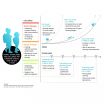Horizon Report urges schools to tackle 'wicked' digital skills challenge
2014-10-02
(Press-News.org) This news release is available in French, Spanish and German.
Low digital skills and competences among school pupils and the need to integrate effective use of information and communication technologies into teacher training are among the most pressing challenges faced by European school education today, according to a report published by the European Commission and the New Media Consortium, a US-based not-for-profit body bringing together experts in education technology. The first-ever Horizon Report Europe: 2014 Schools edition outlines the trends and technological developments that are likely to have an impact on education over the next five years. It grades the challenges faced by European schools in three categories: 'Solvable', 'Difficult' and 'Wicked'.
The report echoes the objectives of the Commission's Opening up Education initiative and is based on input from more than 50 experts from 22 European countries, the Commission's Joint Research Centre, the Organisation for Economic Cooperation and Development (OECD) and the United Nations' Educational, Scientific and Cultural Organisation (UNESCO). It says action is urgently needed to promote innovation in the classroom to take advantage of increased use of social media, open educational resources and the rise of data-driven learning and assessment.
"This report provides valuable insights and guidance for policy-makers and school leaders about the need to embrace digital and open resources. Europe needs to raise its game if we are to ensure our young generation are prepared for their future careers," said Androulla Vassiliou, European Commissioner for Education, Culture, Multilingualism and Youth. "Improved digital skills and access to digital and open resources are crucial, not just for better teaching, but also for creating flexible education models that make life-long learning easier."
The report states that integrating ICT in teacher education and addressing students' low digital competence are solvable challenges. Creating 'authentic' learning opportunities, based on real-life experience, and blending formal and non-formal education, will be more difficult to implement in the short-term. The toughest, 'wicked' challenges include the need to improve the teaching of complex thinking and ensuring students are 'co-designers' of learning.
The panel predicts that cloud and tablet computing will be commonplace in many European schools within a year, while learning through computer games and a combination of physical and virtual environments will be an integral part of teaching in the next two to three years. The experts suggest that it may take up to five years to develop remote and virtual laboratories and to develop strategies that encourage students to take an active role in co-designing their learning.
INFORMATION:
Issues such as those raised by the Horizon Report will be further discussed in December at the European High Level 'Education in the Digital Era' conference, jointly organised by the European Commission and the Italian Presidency of the European Union.
[Attachments] See images for this press release:

ELSE PRESS RELEASES FROM THIS DATE:
2014-10-02
A study analysing the positive and negative effects of energy drinks on athletes has seen that, although in principle their sports performance was seen to improve by between 3% and 7%, there was also an increase in the frequency of insomnia, nervousness and the level of stimulation in the hours following competition.
The consumption of energy drinks has increased in recent years. In the case of athletes, the use of them before practising sport has also risen: more than 50% take them during training and even before competitions.
A four-year study carried out by experts ...
2014-10-02
This news release is available in Spanish. According to a recent paper published by the researchers Aritz Urdampilleta-Otegui, PhD in Physical Education and Sports and lecturer in the Department of Physical and Sports Education of the UPV/EHU-University of the Basque Country and at the Government of the Basque Autonomous Community (region), and Saioa Gómez-Zorita, PhD in Pharmacy and Food Sciences and researcher at the UPV/EHU's Department of Pharmacy and Food Sciences, it is necessary to control the administering of drugs that interact with the foods consumed and which ...
2014-10-02
Barely perceptible low-frequency signals nevertheless activate measurable responses in our auditory circuits. Neurobiologists at Ludwig-Maximilians-Universitaet (LMU) in Munich have now characterized the remarkable impact of low-frequency sounds on the inner ear.
The human auditory system appears to be poorly adapted to the perception of low-frequency sound waves, as hearing thresholds become markedly higher for frequencies lower than about 250 Hz. Yet sensory cells do react to pressure waves with frequencies below 100 Hz, as revealed by the fact that such signals actually ...
2014-10-02
A new test developed by researchers from the University of Manchester could revolutionise the discovery of new prescription drugs. The test will help determine which drugs are unlikely to work at an early stage, speeding up the time it takes to make safe and effective medicines available. The findings are published online in the journal Metabolomics.
The Pharmaceuticals industry is worth billions of dollars a year. The main source of prescription medicines comes from what are known as 'small molecule' drugs, such as statins and antibiotics.
The main problem for ...
2014-10-02
AUDIO:
These are gray snapper larval growls recorded in the field.
Click here for more information.
MIAMI – A new study from researchers at the University of Miami (UM) Rosenstiel School of Marine and Atmospheric Science is the first to document that fish larvae produce sound. These "knock" and "growl" sounds may help small larvae maintain group cohesion in the dark.
"Although many adult fishes produce sounds, no one has previously considered that larvae, too, may be sound ...
2014-10-02
For decades, research has generally focused on individual, family and peer factors to explain illicit drug use, neglecting neighborhood factors as a cause. While the scant previous research on neighborhood factors and illicit drug use has focused on facets such as crime and socio-demographic characteristics, none has explored the associations between the perceived frequency of drug sales, drug use, and peer attitudes towards drug use. Now a study out of New York University's Center for Drug Use and HIV Research (CDUHR), address this paucity in the research.
Published ...
2014-10-02
Schizophrenia and bipolar disorder both appear to be associated with dendritic spine loss in the brain, suggesting the two distinct disorders may share common pathophysiological features, write author Glenn T. Konopaske, M.D., and colleagues at McLean Hospital, Belmont, Mass., and Harvard Medical School, Boston.
The dendritic spines play a role in a variety of brain functions. Previous studies have observed spine loss in the dorsolateral prefrontal cortices (DLPFCs) from individuals with schizophrenia (SZ). To determine whether spine pathology happens in individuals with ...
2014-10-02
EAST LANSING, Mich. --- New research suggests dear old Mom and Dad could be the auto industry's secret weapon.
The study, co-authored by Michigan State University economist Soren Anderson, found children are 39 percent more likely to buy a particular brand of automobile if their parents bought that brand.
This surprisingly strong correlation could have implications for automakers' marketing efforts. In absence of this inherited brand loyalty, a sensible strategy might be to "invest in young consumers and harvest old consumers" – that is, lower prices on entry-level ...
2014-10-02
A group of researchers from Switzerland has thrown light on the precise mechanisms responsible for the impressive ability of nanoparticles to detect fingermarks left at crime scenes.
Publishing their results today, 2 October, in IOP Publishing's journal Nanotechnology, the researchers have provided evidence contesting the commonly accepted theory that nanoparticles are attracted to fingermarks electrostatically.
The attraction, they claim, is in fact chemical and is caused by compounds on the surface of nanoparticles bonding with a complex cocktail of compounds present ...
2014-10-02
People who are prone to delusions gather insufficient information before making decisions, according to research published in the journal Psychological Medicine.
Researchers from Royal Holloway, University of London, led by PhD student Leslie van der Leer, assigned participants a computer task in which they observed the colour of a black or white fish caught from one of two lakes and were then asked to choose to see further fish or decide on one of the lakes as the source of that sequence of fish.
Each participant was rewarded for choosing the correct lake but costs ...
LAST 30 PRESS RELEASES:
[Press-News.org] Horizon Report urges schools to tackle 'wicked' digital skills challenge



